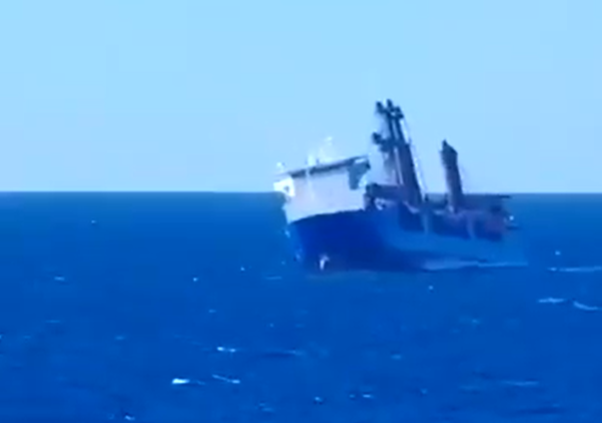A Russian cargo ship, Ursa Major, sank in the Mediterranean Sea earlier this week, with its owner alleging the incident was a deliberate "act of terrorism." The ship went down in international waters between Spain and Algeria, leaving two crew members missing and prompting an investigation into the circumstances surrounding the event.
The vessel, operated by Oboronlogistika, a company affiliated with the Russian Defense Ministry, reportedly experienced three explosions on its starboard side before it began taking on water and capsized. The explosions, which the company described as deliberate, occurred on Monday afternoon. Fourteen of the ship's 16 crew members were rescued and brought to safety by Spanish maritime authorities, while two remain unaccounted for.
Spain's Maritime Rescue Service stated that the Ursa Major had issued a distress signal reporting severe listing and bad weather conditions. Rescue operations commenced immediately, with surviving crew members transported to the Spanish port of Cartagena. The Russian Foreign Ministry confirmed that the ship had been carrying two port cranes weighing 380 tons each, along with other industrial cargo, en route from St. Petersburg to Vladivostok.
The owner, Oboronlogistika, has suggested foul play, calling the incident an act of terrorism, though it refrained from naming a specific party responsible. The company's ties to Russia's defense infrastructure have made the ship and its operators the target of U.S. sanctions since 2022. Moscow has not provided evidence to substantiate the claims of terrorism but noted the unusual nature of the incident.
The Ursa Major, which was built in 2009, was a significant vessel in Oboronlogistika's fleet, with a cargo capacity of 1,200 tons. Tracking data showed that the ship had recently departed St. Petersburg and had signaled its next destination as Vladivostok. Its route through the Mediterranean avoided ports where it had previously stopped, such as Tartous in Syria, raising questions about its exact purpose and destination.
While speculation swirled about potential involvement from Ukraine, Kyiv denied any connection to the sinking. Ukrainian navy spokesperson Dmytro Pletenchuk stated that while Russia faces challenges maintaining its fleet, there was no indication Ukraine played a role. Analysts noted that Ukraine's military actions have largely been confined to the Black Sea, and an operation in the Mediterranean would represent a significant tactical shift.
The incident has drawn attention to the vulnerabilities of Russia's maritime fleet, which has been increasingly reliant on aging and poorly maintained vessels due to international sanctions. These sanctions, imposed following Moscow's 2022 invasion of Ukraine, have disrupted the operations of Russian shipping companies, forcing them to rely on a so-called "ghost fleet" to navigate global restrictions.
Oboronlogistika and SK-Yug, another entity tied to the ship's operation, have declined to comment further on the sinking. Both companies remain under scrutiny for their connections to Russia's military supply chain.




